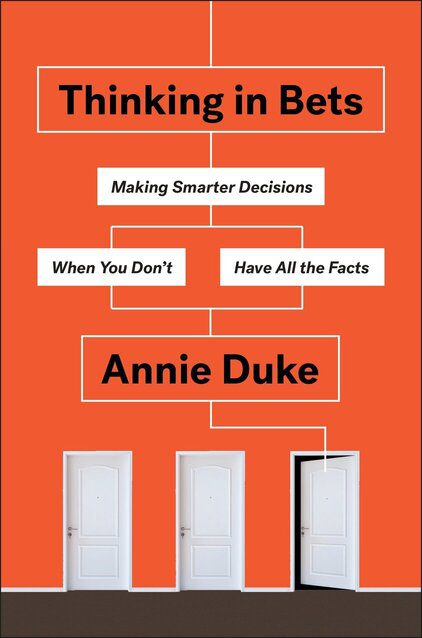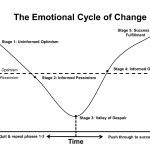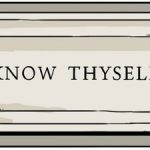Title: Thinking in Bets: Making Smarter Decisions When You Don’t Have All the Facts
Author: Annie Duke
In Thinking in Bets, former World Series of Poker champion turned business consultant, Annie Duke, shares strategies from the world of poker, business, sports, politics; on how anyone can embrace uncertainty and make better decisions. Professional poker players are comfortable with the fact that great decisions don’t always lead to great outcomes and bad decisions don’t always lead to bad outcomes.
Thinking in Bets
Thinking in bets starts with recognizing that there are exactly two things that determine how our lives turn out: the quality of our decisions and luck. Learning to recognize the difference between the two is what thinking in bets is all about.
Decisions are bets on the future, and they aren’t “right” or “wrong” based on whether they turn out well on any particular iteration. An unwanted result doesn’t make our decision wrong if we thought about the alternatives and probabilities in advance and allocated our resources accordingly.
Resulting
Resulting: Our tendency to equate the quality of a decision with the quality of its outcome.
Resulting is a routine thinking pattern that bedevils all of us. Drawing an overly tight relationship between results and decision quality affects our decisions every day, potentially with far-reaching, catastrophic consequences.
Hindsight Bias
Hindsight bias is the tendency, after an outcome is known, to see the outcome as having been inevitable. When we say, “I should have known that would happen,” or, “I should have seen it coming,” we are succumbing to hindsight bias. Those beliefs develop from an overly tight connection between outcomes and decisions. That is typical of how we evaluate our past decisions.
Chess vs Poker
Chess, for all its strategic complexity, isn’t a great model for decision-making in life, where most of our decisions involve hidden information and a much greater influence of luck. This creates a challenge that doesn’t exist in chess: identifying the relative contributions of the decisions we make versus luck in how things turn out.
Poker, in contrast, is a game of incomplete information. It is a game of decision-making under conditions of uncertainty over time. (Not coincidentally, that is close to the definition of game theory.) Valuable information remains hidden. There is also an element of luck in any outcome. You could make the best possible decision at every point and still lose the hand, because you don’t know what new cards will be dealt and revealed. Once the game is finished and you try to learn from the results, separating the quality of your decisions from the influence of luck is difficult.
Life is more like poker.
You could make the smartest, most careful decision in firing a company president and still have it blow up in your face. You could run a red light and get through the intersection safely—or follow all the traffic rules and signals and end up in an accident. You could teach someone the rules of poker in five minutes, put them at a table with a world champion player, deal a hand (or several), and the novice could beat the champion. That could never happen in chess.
I’m not Sure
We are discouraged from saying “I don’t know” or “I’m not sure.” We regard those expressions as vague, unhelpful, and even evasive. But getting comfortable with “I’m not sure” is a vital step to being a better decision-maker. We have to make peace with not knowing.
Embracing “I’m not sure” is difficult. We are trained in school that saying “I don’t know” is a bad thing. Not knowing in school is considered a failure of learning. Write “I don’t know” as an answer on a test and your answer will be marked wrong.
“Admitting that we don’t know has an undeservedly bad reputation. Of course, we want to encourage acquiring knowledge, but the first step is understanding what we don’t know”
Probabilistic Thinking
When we think probabilistically, we are less likely to use adverse results alone as proof that we made a decision error, because we recognize the possibility that the decision might have been good but luck and/or incomplete information (and a sample size of one) intervened.
Opportunity Cost
Whenever we choose an alternative (whether it is taking a new job or moving to Des Moines for a month), we are automatically rejecting every other possible choice. All those rejected alternatives are paths to possible futures where things could be better or worse than the path we chose. There is potential opportunity cost in any choice we forgo.
All decisions are bets
A decision about a stock (buy, don’t buy, sell, hold, not to mention esoteric investment options) involves a choice about the best use of financial resources. Incomplete information and factors outside of our control make all our investment choices uncertain. We evaluate what we can, figure out what we think will maximize our investment money, and execute. Deciding not to invest or not to sell a stock, likewise, is a bet. These are the same decisions I make during a hand of poker: fold, check, call, bet, or raise.
Hearing is believing
We form beliefs in a haphazard way, believing all sorts of things based just on what we hear out in the world but haven’t researched for ourselves.
This is how we think we form abstract beliefs:
We hear something;
We think about it and vet it, determining whether it is true or false; only after that
We form our belief.
It turns out, though, that we actually form abstract beliefs this way:
We hear something;
We believe it to be true;
Only sometimes, later, if we have the time or the inclination, we think about it and vet it, determining whether it is, in fact, true or false.
How we form beliefs, and our inflexibility about changing our beliefs, has serious consequences because we bet on those beliefs. Every bet we make in our lives depends on our beliefs: who we believe will make the best president, if we think we will like Des Moines, if we believe a low-fat diet will make us healthier, or even if we believe turkeys can fly.
Truthseeking
Truthseeking, the desire to know the truth regardless of whether the truth aligns with the beliefs we currently hold, is not naturally supported by the way we process information. We might think of ourselves as open-minded and capable of updating our beliefs based on new information, but the research conclusively shows otherwise. Instead of altering our beliefs to fit new information, we do the opposite, altering our interpretation of that information to fit our beliefs.
There is a big difference between getting experience and becoming an expert. That difference lies in the ability to identify when the outcomes of our decisions have something to teach us and what that lesson might be.
Luck vs. skill: fielding outcomes
The way our lives turn out is the result of two things: the influence of skill and the influence of luck. For the purposes of this discussion, any outcome that is the result of our decision-making is in the skill category. If making the same decision again would predictably result in the same outcome, or if changing the decision would predictably result in a different outcome, then the outcome following that decision was due to skill.
The quality of our decision-making was the main influence over how things turned out. If, however, an outcome occurs because of things that we can’t control (like the actions of others, the weather, or our genes), the result would be due to luck. If our decisions didn’t have much impact on the way things turned out, then luck would be the main influence.
we take credit for good things and deflect blame for bad things.
Self-serving bias
Self-serving bias has immediate and obvious consequences for our ability to learn from experience.* Blaming the bulk of our bad outcomes on luck means we miss opportunities to examine our decisions to see where we can do better. Taking credit for the good stuff means we will often reinforce decisions that shouldn’t be reinforced and miss opportunities to see where we could have done better. To be sure, some of the bad stuff that happens is mainly due to luck. And some of the good stuff that happens is mainly due to skill.
100% of our bad outcomes aren’t because we got unlucky and 100% of our good outcomes aren’t because we are so awesome. Yet that is how we process the future as it unfolds.
People watching
You can observe a lot by watching. – Yogi Berra
When any of us makes decisions in life away from the poker table, we always have something at risk: money, time, health, happiness, etc. When it’s someone else’s decision, we don’t have to pay to learn. They do. There’s a lot of free information out there.
Unfortunately, learning from watching others is just as fraught with bias. Just as there is a pattern in the way we field our own outcomes, we field the outcomes of our peers predictably. We use the same black-and-white thinking as with our own outcomes, but now we flip the script. Where we blame our own bad outcomes on bad luck, when it comes to our peers, bad outcomes are clearly their fault. While our own good outcomes are due to our awesome decision-making, when it comes to other people, good outcomes are because they got lucky.
Perspective taking
Perspective taking gets us closer to the truth because that truth generally lies in the middle of the way we field outcomes for ourselves and the way we field them for others. By taking someone else’s perspective, we are more likely to land in that middle ground.
Once we start actively training ourselves in testing alternative hypotheses and perspective taking, it becomes clear that outcomes are rarely 100% luck or 100% skill. This means that when new information comes in, we have options beyond unquestioned confirmation or reversal. We can modify our beliefs along a spectrum because we know it is a spectrum, not a choice between opposites without middle ground.
Calibration
We don’t win bets by being in love with our own ideas. We win bets by relentlessly striving to calibrate our beliefs and predictions about the future to more accurately represent the world. In the long run, the more objective person will win against the more biased person. In that way, betting is a form of accountability to accuracy. Calibration requires an open-minded consideration of diverse points of view and alternative hypotheses. Wrapping all that into your group’s charter makes a lot of sense.
Echo Chambers
Although the Internet and the breadth of multimedia news outlets provide us with limitless access to diverse opinions, they also give us an unprecedented opportunity to descend into a bubble, getting our information from sources we know will share our view of the world. We often don’t even realize when we are in the echo chamber ourselves, because we’re so in love with our own ideas that it all just sounds sensible and right. In political discourse, virtually everyone, even those familiar with groupthink, will assert, “I’m in the rational group exchanging ideas and thinking these things through. The people on the other side, though, are in an echo chamber.
We must be vigilant about this drift in our groups and be prepared to fight it. Whether it is the forming of a group of friends or a pod at work—or hiring for diversity of viewpoint and tolerance for dissent when you are able to guide an enterprise’s culture toward accuracy—we should guard against gravitating toward clones of ourselves. We should also recognize that it’s really hard: the norm is toward homogeneity; we’re all guilty of it; and we don’t even notice that we’re doing it.
Temporal Discounting.
This tendency we all have to favor our present-self at the expense of our future-self is called temporal discounting.* We are willing to take an irrationally large discount to get a reward now instead of waiting for a bigger reward later.
We are built for temporal discounting, for using the resources that are available to us now as opposed to saving them for a future version of us that we aren’t particularly in touch with in the moment of the decision. Time traveling can get us in touch with that future version of us. It can get future-us to remind present-us, “Hey, don’t discount!” Or at least, “Don’t discount so much!
Reconnaissance: mapping the future”
For us to make better decisions, we need to perform reconnaissance on the future. If a decision is a bet on a particular future based on our beliefs, then before we place a bet we should consider in detail what those possible futures might look like. Any decision can result in a set of possible outcomes.
Thinking about what futures are contained in that set (which we do by putting memories together in a novel way to imagine how things might turn out) helps us figure out which decisions to make.
Backcasting: working backward from a positive future
When we forecast the future, we run the risk of a similar distortion. From where we stand, the present and the immediate future loom large. Anything beyond that loses focus.
Imagining the future recruits the same brain pathways as remembering the past. And it turns out that remembering the future is a better way to plan for it. From the vantage point of the present, it’s hard to see past the next step. We end up over-planning for addressing problems we have right now. Implicit in that approach is the assumption that conditions will remain the same, facts won’t change, and the paradigm will remain stable.
The most common form of working backward from our goal to map out the future is known as backcasting. In backcasting, we imagine we’ve already achieved a positive outcome, holding up a newspaper with the headline “We Achieved Our Goal!” Then we think about how we got there.
Premortems: working backward from a negative future
We start a premortem by imagining why we failed to reach our goal: our company hasn’t increased its market share; we didn’t lose weight; the jury verdict came back for the other side; we didn’t hit our sales target. Then we imagine why. All those reasons why we didn’t achieve our goal help us anticipate potential obstacles and improve our likelihood of succeeding.
A premortem is an implementation of the Mertonian norm of organized skepticism, changing the rules of the game to give permission for dissent. Being a team player in a premortem isn’t about being the most enthusiastic cheerleader; it’s about being the most productive heckler.
All the Best in your quest to get better. Don’t Settle: Live with Passion.



1 Comment
Pingback: 100 Books Reading Challenge 2021 – Lanre Dahunsi